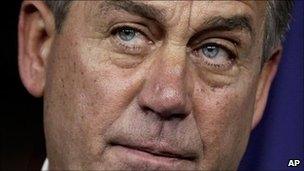Tea Party challenge looms over US debt showdown
- Published
- comments

John Boehner has so far been unable to muster backing for his bill
John Boehner, a man prone to easy tears, has a reason to cry.
For the moment at least he can't get enough votes for his own plan to deal with America's budget crisis.
It is not that it was ever the answer. But his humiliation, even if only temporary, shows how hard it will be to reach any solution.
As the Dow Jones industrial average slipped for the fifth day running, as America watches with horrified fascination, the politicians have failed even to complete the first part of this ritual.
The Republican leadership scrambled all day to persuade their own hardline conservatives to back the party's plan, and failed, at first delaying a vote and then calling it off for the night.
As I write it is not clear if there will be a vote, and when it might be.
Some newly elected Republicans don't like particular details of the Boehner plan, but others are opposed in principle to America borrowing any more money.
They dismiss suggestions that if the debt ceiling isn't raised it will trigger an economic crisis.
It's not that the Republican plan to cut spending and raise the debt ceiling stands much chance - it would almost certainly be killed off in the Senate, where the Democrats have a majority.
When that happens they would start talking about a compromise.
But when it is this hard for the Republican leaders to get Republican members to vote for a Republican plan, it underscores the power, determination and strength of the Tea Party movement.
And it starkly illustrates the huge difficultly any compromise, inevitably more flawed in the eyes of the Tea Party, will face.
Most observers expect a deal to be done at the last minute. But they may be making predictions based on past behaviour.
The Tea Party are different.